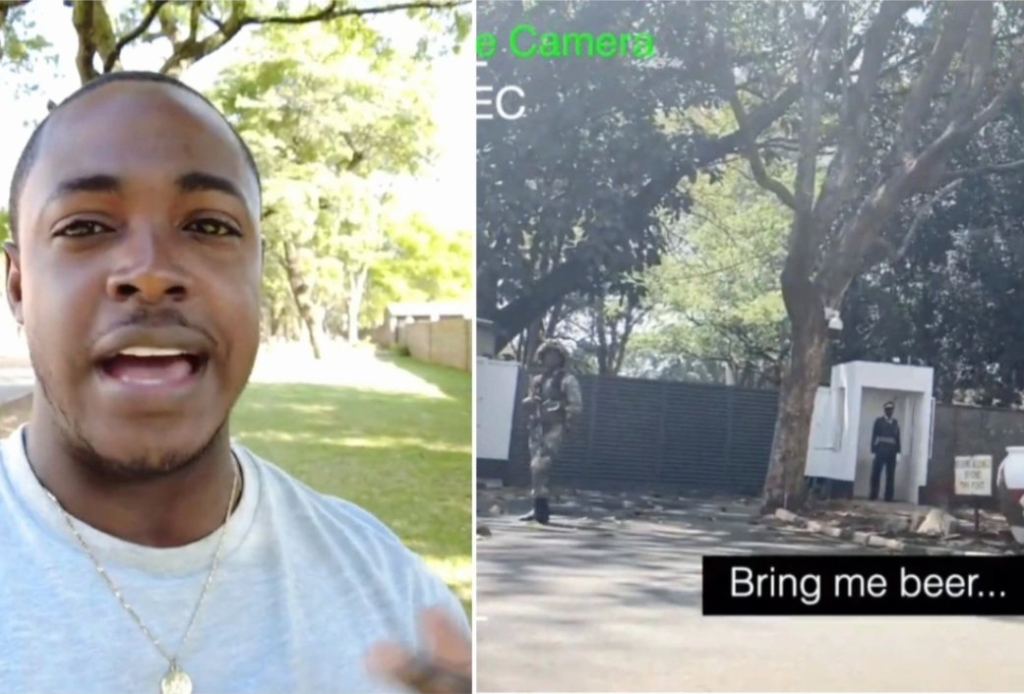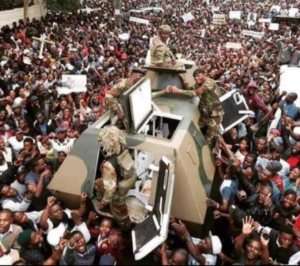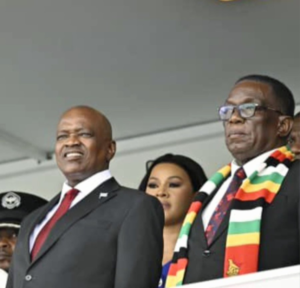ZIMBABWEAN SOLDIERS’ CRY FOR BEER AMIDST LUXURY DISPARITY

In a striking snapshot of the stark socio-economic divide within Zimbabwe, a video captured by an American traveler visiting Kenya has brought attention to the dire circumstances facing some of the nation’s soldiers. While the elite, including President Emmerson Mnangagwa and his inner circle, revel in opulence, those who are tasked with guarding the State House have been revealed to earn as little as US$170 a month and even resort to requesting beer to escape their daily struggles.
The video, which has since gone viral, paints a compelling picture of the unequal distribution of wealth and resources within Zimbabwe. The American traveler, a seasoned tourist adventurer, stumbled upon this revealing encounter while documenting his journey through Africa. What he captured on camera was a sobering glimpse into the lives of the soldiers stationed outside State House, the official residence of the President.
In the footage, Zimbabwean soldiers can be seen approaching the American tourist, engaging in a candid conversation that laid bare the harsh realities they face. With a tinge of desperation, one soldier requested beer from the tourist, exposing the extent of their struggles and the desire for a brief respite from their challenging lives.
Perhaps the most distressing revelation in the video was the disclosure of their meager earnings. At just US$170 per month, these soldiers earn wages that fall far below the poverty line, leaving them trapped in a cycle of financial hardship. This paltry income is in stark contrast to the lavish lifestyles enjoyed by Mnangagwa, his family, relatives, friends, and close associates.
President Mnangagwa and his inner circle have faced increasing criticism for their extravagant lifestyles, with accusations of corruption and mismanagement of the nation’s resources. While the majority of Zimbabweans grapple with economic hardships, a select few continue to accumulate wealth and luxuries beyond imagination. The contrast between the soldiers’ modest salaries and the extravagant lifestyles of the ruling elite highlights the growing chasm between the haves and the have-nots in Zimbabwe.
The American traveler’s video serves as a poignant reminder of the need for equitable distribution of resources and opportunities within the country. It has ignited a wave of discussions both within Zimbabwe and on the international stage, prompting questions about the government’s commitment to addressing the pressing issues of poverty and economic inequality.
Zimbabwe has a long history of economic challenges, characterized by hyperinflation, unemployment, and a struggling healthcare system. The revelations in the video only serve to underscore the urgent need for comprehensive reforms that prioritize the well-being of all citizens, not just the privileged few.
While the government has made efforts to address some of these issues, including launching economic reform initiatives, much work remains to be done. Ensuring that soldiers, who play a crucial role in safeguarding the nation, receive fair compensation is a critical step towards building a more just and equitable society.
The American traveler’s video may have shone a spotlight on the disparities within Zimbabwe, but it also highlights the power of social media and citizen journalism in holding those in power accountable. It is a testament to the importance of individuals sharing their experiences and shedding light on the pressing issues that often go unnoticed.
In conclusion, the video capturing Zimbabwean soldiers’ plea for beer amidst the backdrop of opulence exposes a harsh reality that cannot be ignored. It is a stark reminder that true progress and prosperity can only be achieved when the benefits of a nation’s resources are equitably shared among all its citizens. Zimbabwe, like many nations facing economic disparities, must grapple with these issues head-on to ensure a brighter and more equitable future for its people.



